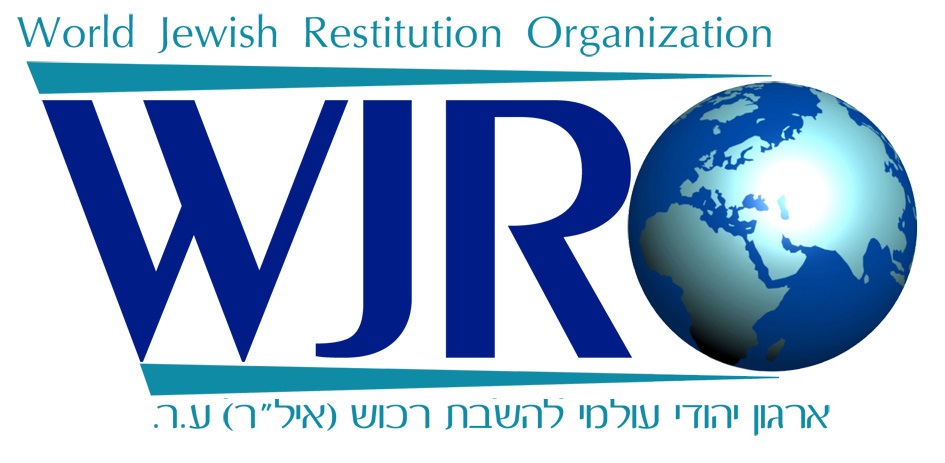
WORLD JEWISH RESTITUTION ORGANIZATION (WJRO) DELEGATION VISITS MOLDOVA TO MEET WITH GOVERNMENT OFFICIALS AND PRESENT AT KISHINEV POGROM CONFERENCE: 120 YEARS LATER
WJRO delegation meets with Moldova’s first-ever Special Representative for the Policies of Memory (Holocaust) and Combating Antisemitism; contributes to Kishinev Pogrom Conference: 120 Years Later, alongside government officials, academics, experts, and members of the Jewish Community of Moldova
(New York, NY) November 16, 2023: A delegation from the World Jewish Restitution Organization (WJRO) visited Moldova to meet with Serghei Diaconu, Moldova’s first-ever Special Representative for the Policies of Memory (Holocaust) and Combating Antisemitism to discuss outstanding Holocaust era property issues involving Jewish communal and religious property. The WJRO delegation also met with Amb. Janis Mazeiks, Head of the EU delegation to Moldova, and Amb. Kent Logsdon, US Ambassador to Moldova. The timing of the visit coincided with the conference, “Kishinev Pogrom – 120 Years Later: Relevance of Study and Historical Memory,” which brought together an international group of government officials, academics, experts, and members of the Jewish Community of Moldova. Additionally, WJRO representatives presented at the Conference on the importance of Holocaust era property restitution and made the case that commemoration without action is not enough – to remember the victims of the Kishinev Pogrom and the subsequent attempts to extinguish Jewish life from Moldova it is vital to address outstanding issues.
“While we can’t help the victims of the Kishinev pogrom anymore, we can still help Holocaust survivors and their families. These measures would include restitution of communal property as well as restoration of synagogues and other communal institutions to their original owners, the Jewish Community of Moldova. The Kishinev Pogrom, as well as recent events in Israel, underscore the need to help provide justice and assistance to survivors of the Holocaust even as we are witnessing the impact of violent antisemitism today. We look forward to working together with the newly appointed Special Representative to address outstanding Holocaust era issues,” said Mark Weitzman, Chief Operating Officer, World Jewish Restitution Organization (WJRO).
“The current conference, organized by the Jewish Community of the Republic of Moldova in partnership with the State University of Moldova, the Government of Moldova, the Embassy of the State of Israel in Moldova, the Embassy of Italy in Moldova, and the World Jewish Restitution Organization, is the last major event this year, closing the chain of commemorative activities, dedicated to the tragic events of 120 years ago,” said Alexandr Bilinkis, President, Jewish Community of Moldova. “It was the Kishinev Pogrom of 1903 that became not only a fact, but also a factor in world history. It was the Kishinev Pogrom of 1903 that became a symbol of antisemitism in the world: the word ‘Pogrom’ entered the languages of the world and, unfortunately, was often associated with the name of our city.”
Noted participants at the conference include: Serghei Diaconu, Special Representative for the Policies of Memory (Holocaust) and Combating Antisemitism, and Chief of Prime Minister’s Office of the Republic of Moldova, Sergiu Prodan, Minister of Culture of the Republic of Moldova; Janis Mazeiks, Head of the EU Delegation to the Republic of Moldova; Joel Lion, Ambassador of the State of Israel to the Republic of Moldova; Lorenzo Tomassoni, Ambassador of Italy to the Republic of Moldova; Steven Zipperstein, PhD, Professor in Jewish Culture and History at Stanford University, USA; Aliona Grossu, CEO, Jewish Community of the Republic of Moldova; Mark Weitzman, Chief Operating Officer, WJRO; Samantha Wynne, Director of International Affairs, WJRO; and Ovi Creanga, Historian, WJRO/Conference on Jewish Material Claims Against Germany (Claims Conference).
Background
In 1903, a pogrom took place in Kishinev, what is today the Moldovan capital of Chisinau, that would forever alter the course of Jewish history. On the eve of Passover, the Russian-language newspaper Bessarabets, headed by nationalist leader Pavel Krushevan, accused Jews of a “blood libel,” claiming that they had committed the ritual murder of a Christian child. The official investigation proved the guilt of a close relative of the child, but it was too late, and a pogrom took place on 19-20 April (6-7 April according to the Julian calendar). 49 people were killed, 586 people were wounded, one third of all homes and hundreds of Jewish shops in Chisinau were destroyed during the Pogrom.
The legacy of the Kishinev Pogrom was enormous. Occurring at a time when photography was on the rise, images of the Pogrom appeared in newspapers around the world making it among the first widely photographed acts of violent antisemitism. The Pogrom brought international awareness of the persecution of Jews in Imperial Russia thereby convincing early Zionists of the importance of their cause and the creation of several Jewish humanitarian and defense organizations. It also led to large-scale emigration from Russia to other parts of Europe and both North and South America.
The Kishinev pogrom of 1903, occurring at the very beginning of the 20th century, became a horrifying forerunner of the Holocaust.
—
Prior to the Holocaust, approximately 230,000 Jews lived in present-day Moldova. It is estimated that 130,000 of them were murdered during the Holocaust. Jewish property was systematically looted and nationalized, including homes, religious sites, synagogues and educational institutions.
For media inquiries please contact pr@wjro.org.il





